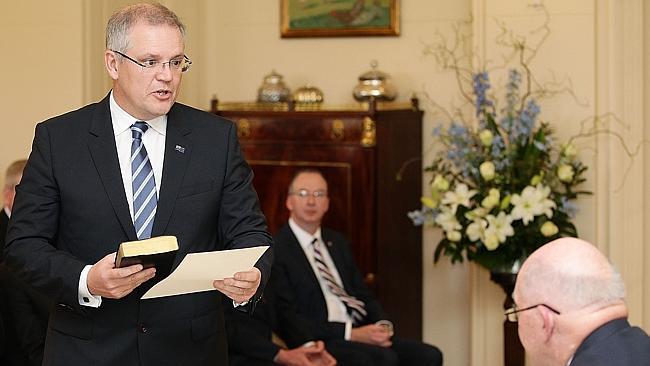Brian Morris: Pollies should declare how religion may impact on policy agenda
IT’S striking that many of Malcolm Turnbull’s new ministers were sworn in using personal Bibles — presumably to reinforce their commitment, before God, to service in a secular government. The irony will be lost on many.

Opinion
Don't miss out on the headlines from Opinion. Followed categories will be added to My News.
IT’S striking that many of Malcolm Turnbull’s new ministers were sworn in using personal Bibles – presumably to reinforce their commitment, before God, to service in a secular government. The irony of this will be lost on many.
The God-quoting Tony Abbott has been replaced by another Catholic, a convert, and PM Turnbull is well known for quoting the G-word. Religion in the political class is endemic.
Scott Morrison railed against 2GB’s Ray Hadley over religion, and Canning’s new Liberal member, Andrew Hastie, declared “off limits” all questions about his family links with creationism.
The central issue here is not simply about one’s belief in God, it’s about transparency – being honest with the electorate about how one’s belief in a religious doctrine affects the entire sociopolitical agenda.
Federal and state parliaments are over-represented by proactive religious politicians and they’re out of step with a public that is now more than 50 per cent non-Christian.
A Nielsen poll shows 84 per cent of respondents want religion separated from politics.
Religion in politics has flown under the media radar for decades and it’s played a blocking role on a broad range of social policy, from climate change to voluntary euthanasia.
Same-sex marriage is another example of religious influence, where two-thirds of the Liberal party room torpedoed their conscience vote. And Labor’s record is no better.
In truth, the electorate has virtually no idea what religious beliefs our politicians hold, and how their adherence to Biblical teachings affect their decisions.
But the solution is quite easy. At each election, candidates would merely include – in their political biographies – the religious beliefs they hold and the social policies they oppose, based on those beliefs. It would apply equally to non-religious candidates.
In no way does this compromise their constitutional right to faith. And such obligations might initially be voluntary.
The Australian public is becoming increasingly secular. In the 2016 Census the “no religion” figure is expected to double to about 50 per cent – up from 22.3 per cent in 2011. The Catholic figure is likely to fall from 25.3 to below 20 per cent.
If the disproportion of religious politicians continues it becomes essential that their beliefs are publicly known so that voters can make rational choices at each election.
In this evidence-based era we need reason and critical thinking, not religious doctrine, to determine social issues.
To be fully secular, Australia must remove the 1950s taboo “don’t question religion”. The public requires transparency to prevent politicised religion from covertly obstructing progressive social policy.
Brian Morris is Director of Plain Reason and author of the new book Sacred to Secular.


